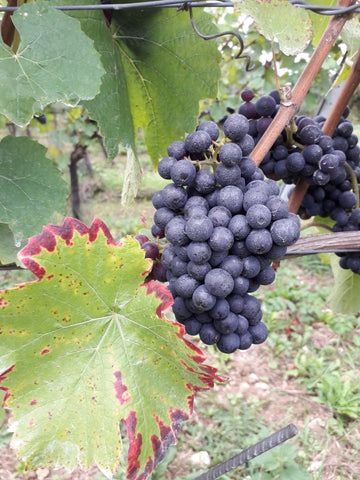International Pinot Noir Day | 10 Facts About Pinot Noir
Pinot Noir, the elusive, tricky, fickle grape variety, hard to grow, difficult to work with at times but like anything in life, sometimes the harder something is to do, the better it is in the end... As it's International Pinot Noir Day (yep, there's literally a day for everything isn't there?) we thought we would give you a little taste of why it's such an important grape variety to us, after all, the only wine we don't use this variety in is our Still Chardonnay and Blanc de Blanc. Naturally, you may not care about the difference between Pinot Noir and Pinot Meunier so feel free to go back to what you were doing. However, if you want a little more information to enhance your knowledge about this amazing grape variety then perhaps you might even be able to throw out a few of these nuggets, to impress at your next dinner party...
Pinot Noir for Beginners
- Pinot Noir is a red grape variety (we actually call it black-skinned in the trade but this only serves to confuse things further), but the flesh is clear, hence why we can make a white wine out of a dark-skinned grape.
- Pinot Noir is one of the three key grape varieties that are used to make Champagne and indeed English sparkling wine.
- Pinot Noir is grown all over the world but predominantly in cooler climates which is where it does best.
- Pinot Noir makes some of the most expensive wines in the world; think Burgundy and Champagne.
- Pinot Noir is the second most planted grape in the UK, with Chardonnay taking the number one spot. As Wine GB states "The majority of vines planted in recent years have been the traditional champagne varieties of Chardonnay, Pinot Noir and Pinot Meunier, which in total represent more than 60% of all vines planted in the UK (Wine Standards official figures for 2018). Chardonnay makes up 27%, Pinot Noir 26%, Bacchus 8.5%, Pinot Meunier 8% (based on planted area)"
- Pinot Noir is generally a lighter-bodied wine due to its thin skins, unlike something like Cabernet Sauvignon which has much thicker skins, higher tannins and makes more full-bodied wines.
- Pinot Noir is actually poisonous if left to ripen too long (that's a joke, but we just wanted to check that you were still paying attention). However, overripe pinot is horrible.....
- Pinot Noir is one of the two main grape varieties used to make our Blanc de Noirs, you know, the one we make for British Airways (yes we are totally name-dropping here, but we are incredibly proud of ourselves!)
- We love Pinot Noir and yes, that's a fact........

Bonus Facts from our Head Winemaker
- Its official name is the Abel Clone, because Mr Abel was the name of the customs officer who found it, confiscated it, but saved it by planting it in a research vineyard.
- Pinot Noir is a derivation of the grape “Pinot”.
- Pinot is one of the thirteen known “founder varieties” (Jancis Robinson MW’s term) that have parented/evolved so many other grape varietals through crossings and mutations.
- Pinot Noir origins are in eastern France.
- The first historical reference to Pinot Noir was in France, in 1375.
- All of the “Pinot” grapes (Noir, Meunier, Gris, Blanc, Précoce) have identical genetic profiles to Pinot, so are effectively non-identical twins.
- Pinot is a “parent” to Chardonnay and Gamay and is a sort of great uncle/aunt to Syrah and Viognier.
- Pinot forms the original descendant of many Italian varietals too – the vine varieties grown in North-East Italian wine regions and Eastern French wine regions basically all have Pinot in their genetic make-up somewhere.
- The most famous clone of Pinot Noir grown in New Zealand is known as the “Gumboot Clone” because the original cutting material was smuggled into New Zealand in a pair of wellingtons.
- It’s not known for being a tannic wine, but it does have a high concentration of the same sort of tannin that black tea has.
We hope you feel well and truly clued up with just a handful of facts for International Pinot Noir Day 2022. Don't forget you can book one of our Hattingley Valley Wine Tours where we can teach you more about our English wines and how they are made. Try our Hattingley Valley Still Pinot Noir today, it will make for the perfect pairing to your Pinot Noir facts..!








